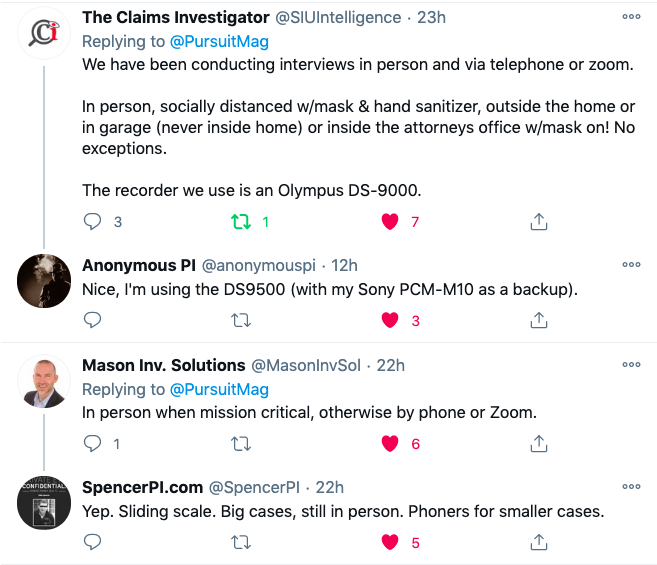
Investigative interviewing is all about creating rapport, building trust, and gently steering the conversation. With COVID safety measures in place, that can get complicated.
I interview people for magazines and radio. My husband Hal, the executive editor of PursuitMag, interviews witnesses in civil and criminal cases. The skills are essentially the same: It’s our job to win people’s trust and convince them to tell us things that are true.
Our aims and biases may be different — Hal’s goal is to clear his client (or at least to offer a strong defense); mine is to tell a compelling story that will make people want to turn the page or turn up the radio. But ultimately, our ends are the same: We want to construct as true and complete a story as possible, no matter how inconvenient the facts may be. We want to understand who did what, and why.
Becoming a great interviewer isn’t difficult, especially if you’re naturally good at talking to people. But even if you’re by nature shy or taciturn, there are several techniques for connecting with folks. Faking it may work occasionally, but the real secret is to show an interest in others — and mean it.
That requires energy. You can’t phone it in (unless, of course, a pandemic forces you to). But if you do the advance work and remember that interviewing is a performance of sorts (one that requires practice), you can set yourself up for a brilliant interview most every time.
Below you’ll find great tips from our contributors about how they conduct investigative interviews — and get the HUMINT they need, even under less-than-ideal circumstances. We’ll add more like this all month. And on Thursday, Jan 28, join us for the free PI Education webinar, where we’ll interview Oliver Mackson, a public defense investigator and ex-reporter with thousands of interviews under his belt. Check this space later this month for a link to that webinar, or subscribe to our channel so you never miss one.
Interviewing During COVID:
via Twitter:

“It’s all back to face-to-face here but during our lockdown it was largely by phone. That was a pain in arse since had to first have subjects fill out a waiver emailed to them and returned prior to interview.” —@AnonymousPI (New Zealand)
“Our interviews have been primarily by telephone.” —@Kusic and Kusic (Vancouver, B.C.)


“I decided to look for a new recorder due to the social distancing. I wanted to make sure that I could record my interviews with little noise interference. I now conduct more interviews outside while social distancing. High winds & other noise do not impact my recording…I now have crisp recordings that I can review while writing my reports. I highly recommend this product.” —@SIUinvestigations (Texas)

